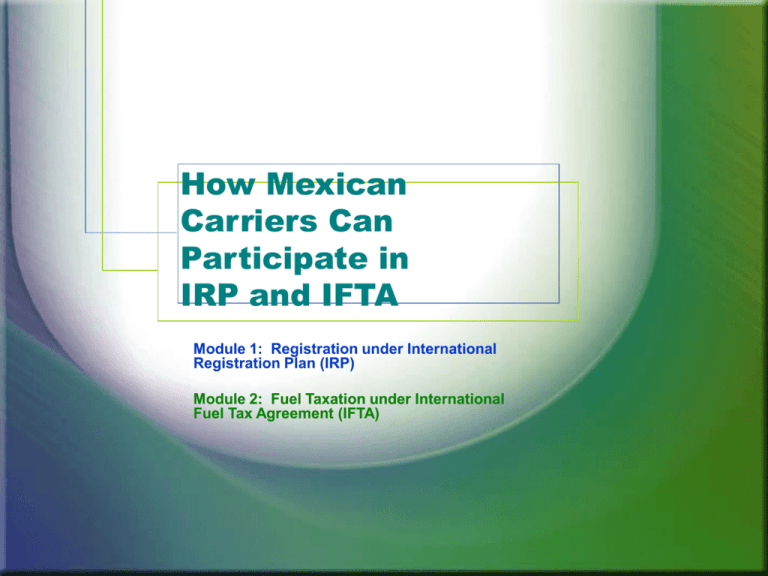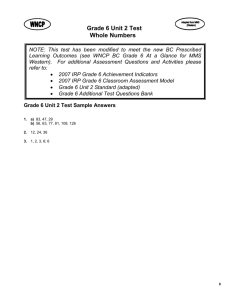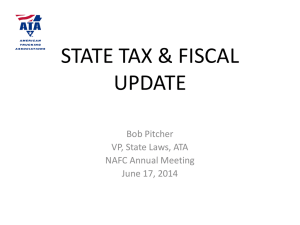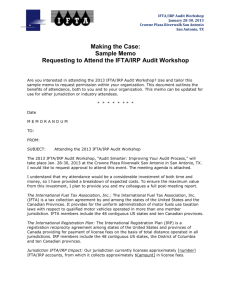Document 20
advertisement

How Mexican Carriers Can Participate in IRP and IFTA Module 1: Registration under International Registration Plan (IRP) Module 2: Fuel Taxation under International Fuel Tax Agreement (IFTA) Goal Learn how to comply with registration requirements under IRP and fuel taxation under IFTA for operations throughout the US and Canada What Are IRP and IFTA? International Registration Plan (IRP) International Fuel Tax Agreement (IFTA) One-Stop Registration – One base jurisdiction to file application and pay fees – One jurisdiction oversees registrant The jurisdiction you select to register your vehicles California, Arizona, New Mexico or Texas, in whichever you expect to travel the most miles in your first year of operation in the US The same jurisdiction for both IRP and IFTA You! For-hire motor carrier Private motor carrier – One set of credentials Household goods carrier Owner-operator Leasing company Fuel Tax Collection Process – Licensee pays tax on each gallon purchased You! For-hire motor carrier Private motor carrier Household goods carrier Owner-operator Leasing company – Licensee summarizes purchases and distances traveled each calendar quarter – Licensee files tax return that calculates tax due to each jurisdiction – Base jurisdiction provides IFTA license and redistributes tax paid in one state/province to compensate use of highways in each state/province in which you operate The document you file quarterly with your base jurisdiction calculating any tax payment due or refund owed you Issued to a licensee upon opening an account, and for each renewal year beginning January 1 Original kept in office, copy kept in cab of each IFTA vehicle IRP-IFTA Similarities – Similar types of vehicles operated – Similar recordkeeping requirements – Audit and enforcement practices But… IRP and IFTA Are Separate and Distinct Programs • IRP • IFTA – Vehicle registration – Fuel use taxation – Pay fees annually in advance of operation – Pay tax upon purchase of fuel and then adjust by jurisdiction on quarterly tax return IRP Prerequisites • USDOT OP-1 (MX) operating authority • Heavy duty trucks, passenger buses, and/or tractor-trailer combinations • Intention to operate in at least 2 IRP jurisdictions Before You License in IFTA • Have USDOT OP-1(MX) operating authority • Have vehicle types authorized for IFTA • Have vehicles registered under IRP Cabotage Limitation • US federal limitations placed on you as a motor carrier, your drivers, and your vehicles as to operations in the US • US federal rules limit your travel to delivery between a point in Mexico and a point in US – Prohibited: Pick up a load in the US for delivery to another point in the US Quick Quiz • What types of fees are collected under IRP? • What types of taxes are collected under IFTA? • Which state must I use as my base jurisdiction? • Can I pick up from and deliver to two US locations in the trip? Your Responsibilities As an IRP Registrant • Filing application and renewal forms • Maintaining records accurately and completely • Paying fees • Displaying license plates, cab cards Your Responsibilities as an IFTA Licensee • Filing application and renewal • Maintaining records • Filing tax returns and payment of taxes due • Displaying IFTA license and decals Creating a Compliant Recordkeeping System • Driver trip logs • Fuel receipts • In-house trip log summaries Recordkeeping for compliance The keys to calculating fees and taxes for payment for travel in IRP/IFTA jurisdictions and staying in compliance When you operate under IRP and IFTA, you agree to retain records and make them available upon request. Records Kept for IRP Maintenance of distance records begins at the time license plates and cab cards are provided by the jurisdiction • Record ALL distance traveled • Record loaded and empty distance • Record whether on company or personal travel in apportionable vehicle • Record travel in Mexico, each US state, each Canadian province 2-axle trucks/buses greater than 26,000 lbs. GVW Trucks/buses with 3 or more axles, regardless of weight Tractor-trailer combinations greater than 26,000 lbs. GVW Used or intended for use in 2 or more IRP jurisdictions Must Log All Trips Date of trip (starting / ending) Trip origin and destination (with city & jurisdiction) Route of travel Beginning and ending odometer or hub odometer reading of the trip Total trip distance traveled Distance traveled by jurisdiction Unit Number or VIN At the discretion of the base jurisdiction, may also require vehicle fleet number, registrant’s name, trailer number, and drivers name/signature Summaries/Recaps to Generate Monthly, quarterly, and annual summary documents of distance generated by vehicle and jurisdiction Records Kept for IFTA • Distance records same as IRP – Document: • All distance traveled • All distance loaded and empty • All distance whether on company or personal travel • All distance in Mexico, Canada, US • All distance from the time IFTA license and decals are put in the vehicle Must Log All Trips • Document: – – – – – – – – Start/end dates of each trip Trip origin/destination (city/jurisdiction) Route of travel (highways traveled on) Beginning/ending odometer/hubometer reading Total trip distance Distance traveled by jurisdiction Units/VINs Fuel purchases Fuel Records Kept • Document: – All fuel purchased, received, and used by IFTA qualified vehicles – All fuel purchased and distance traveled by IFTA jurisdiction and in Mexico – Each fuel type separately for each IFTA vehicle Same as IRP apportionable vehicles 2-axle trucks/buses greater than 26,000 lbs. GVW Trucks/buses with 3 or more axles, regardless of weight Tractor-trailer combinations greater than 26,000 lbs. GVW Used in 2 or more IFTA jurisdictions Fuel Purchase Evidence • Retail fuel purchases supported by a receipt, invoice, credit card receipt, or automated vendor generated invoice or transaction listing. Only purchases in US and Canada are eligible for tax computation purposes; purchases in Mexico are not to be included in tax computation Acceptable Records – Retail Purchase • Acceptable receipt or invoice must contain: • • • • • Date of purchase Name and address of the seller Number of gallons or liters Type of fuel purchased Price paid per gallon or liter or total amount of sale • Vehicle plate, unit, or identification number into which the fuel was delivered • Absence of info = invalid receipt / invoice for tax computation Fuel Records Kept – Bulk Storage • Document: – Record of bulk fuel receipts or purchases, withdrawals, and inventories for each bulk fuel storage location – Details of purchase and inventory records that show tax paid to an IFTA member jurisdiction receive credit on tax return • Absence of info = invalid withdrawal/purchase for IFTA calculation Acceptable Records – Bulk Storage • Acceptable receipt or invoice must contain: • • • • • • Date of purchase Name and address of seller Number of gallons purchased Type of fuel purchased Purchase price with tax included IFTA member jurisdiction in US/CN • Absence of info = invalid receipt / invoice for tax computation Acceptable Records Bulk Storage • Distribution record must document all withdrawals from each bulk storage tank location. • Acceptable distribution record must contain: • • • • Date of withdrawal Number of gallons or liters withdrawn Type of fuel Vehicle plate, unit, or other identification number into which the fuel is delivered • Withdrawals for other purposes than use in IFTA qualified vehicles • Inventory records IFTA Summaries/Recaps To Generate Quarterly summaries For distance records (like IRP requirement) – By individual IFTA vehicle – By jurisdiction For fuel records – For each fuel type – For each IFTA vehicle – For each jurisdiction Internal records may be kept in kilometers and liters Forms submitted for US operation MUST BE in US measurements of miles and gallons Quick Quiz • Name 3 items required on a trip log • If I paid fuel tax on the purchase, what evidence do I need on the receipt to prove that? • I crossed through three states to make my delivery into the fourth and didn’t need to buy fuel until my return. Do I owe tax to the three states I simply traveled through? Before Beginning Operations (New IRP Account) The initial process of establishing an account and the subsequent annual process of renewing registration of a fleet of apportioned/ apportionable vehicles under IRP • Identify base jurisdiction for registration • Apply for apportioned fleet registration on Schedules A/B • Estimate operations One or more apportioned or apportionable vehicles – Use self-constructed business plan OR estimated distance chart available from base jurisdiction • Receive and pay invoice for apportioned fleet registration fees Before Beginning Operations (New IRP Account) • Receive and display license plate and cab card • Create and implement recordkeeping system – Track trips including • Dates of trip • Miles traveled by vehicle • Cumulative miles traveled in each jurisdiction, including Mexico After the Close of Each Month • Regardless of extent of operations (little or even none in that month) – Receive driver trip logs – Consolidate miles by vehicle – Summarize activity of miles by jurisdiction (called a “monthly recap”) After the Close of Each Calendar Quarter • Consolidate monthly recaps into quarterly summary (called a “quarterly recap”) Month 11-12 Of Your IRP Apportioned Fleet Registration Year • Receive renewal application forms from base jurisdiction • Apply for renewal apportioned fleet registration • Document actual miles on application Each Year Of IRP Apportioned Fleet Registration • Repeat monthly and quarterly recordkeeping processes • Repeat renewal application process • Repeat payment process • Repeat exchange of license plates, cab cards for new The IRP Main Application Forms • Schedule A – Annual original application and weight schedule • Schedule B – Annual declaration of intent to travel into IRP jurisdictions and expected distance in each jurisdiction (IRP and non-IRP) in miles • Schedule C – For changes during the year – For vehicle information and weights Proofs Required With IRP Application Forms • IRS Form 2290 – Federal Heavy Vehicle Use Tax (required for gross weight of 55,000 lbs. or more) • Minimum jurisdiction liability insurance • Other documents as required by the base jurisdiction Application Content • • • • • • • • • • Company name and address USDOT number Vehicle owner Gross vehicle weight, unladen weight, make, model of each vehicle in fleet Unit number of each vehicle in IRP fleet Age of each vehicle in IRP fleet Purchase price, factory price, and date of purchase of each vehicle in IRP fleet Number of axles/seats of each vehicle in IRP fleet Vehicle fuel type for each vehicle in IRP fleet VINs Calculating Your IRP Fees • Base jurisdiction will send you a statement of fees owed • Base jurisdiction calculates fees based on Schedule A/B entries you provide Calculating Your IRP Fees • Distance in each jurisdiction traveled – Divided by total distance in US/Canadian jurisdictions (excluding distance generated in Mexico) – Percentage derived above applied to fee required by each jurisdiction for the weight of the vehicle being registered Exercise – Fee Calculation Scenario: - Tractor-semitrailer combination operated in Texas, New Mexico, and Oklahoma for 12 months. - Total distance for all three jurisdictions is 750 miles. - The registered gross weight for all three jurisdictions is 80,000 pounds. Jurisdiction Texas New Mexico Oklahoma Total Distance 6,670 1,330 2,000 10,000 % of Total 12-month Fee per Jurisdiction $817.00 $172.00 $948.00 IRP Fee for EACH Vehicle Fee Calculation Results The total fee for each vehicle’s IRP registration is determined by the percentage of distance traveled in each IRP jurisdiction and each jurisdiction’s fee schedule. Jurisdiction Texas New Mexico Oklahoma Total Distance 6,670 1,330 2,000 10,000 % of Total 66.7% 13.3% 20.0% 100% 12-month Fee per Jurisdiction $817.00 $172.00 $948.00 IRP Fee for EACH Vehicle $544.94 $22.88 $189.60 $757.42 Distance Totals to Use for First and Subsequent Years • First year = Estimates of distance • Construct your own business plan and create estimates or • Use distance chart developed by base jurisdiction • Second year = Distance based on your records of actual distance traveled • All registrants use July 1 – June 30 period preceding their registration year Need to Make a Change During the Registration Year? • Can be done, but must notify base jurisdiction – Schedule C • Provide base with information on change – added vehicles, removed vehicles, added states or provinces you expect to travel Need to Make a Change During the Registration Year? • Estimate added operations for new vehicles added, new states/provinces added • Receive and pay invoice • Receive and install license plates, cab cards • Begin changed operation Licensee Responsibility – IFTA Application Filing • Name of sole owner, all partners, or corporate officers • “Doing Business As” name • Mailing and physical location address • US DOT number • IRP account number • FMCSA OP-1 MX number • Bulk fuel storage locations (if any) • Jurisdictions in which you will travel • Number of qualified vehicles traveling in US/Canada In Addition to Application • Power of Attorney (optional at base jurisdiction discretion) • Surety bond (amount to be determined) IFTA Reporting And Tax Payment Process • File only the tax return mailed to you by your base jurisdiction • File with your base jurisdiction at the address on the printed return • File for each calendar quarter one month after close of quarter • Attach check for outstanding liability or follow base jurisdiction instructions for refund Reporting Liability • Fuel and travel must be reported using United States measurements – gallons & miles – when filing tax return Calculating MPG Ratio • CONVERT FROM KILOMETERS AND LITERS TO MILES AND GALLONS Conversion standards to be used for IFTA: 1 gallon = 3.785 liters 1 mile = 1.6093 km 1 liter = 0.2642 gallons 1 km = 0.62137 miles Calculating Liability Calculate overall mileage-per-gallon (mpg) ratio Total distance traveled (25,000) By : Total amount of fuel used (6,000) on the same miles Get = Average miles per gallon ratio (4.17) [round to 2 decimal places] Divide: Total distance = distance operated in US/CN/MX, distance operated under trip permits and temporary IFTA credential for all qualified motor vehicles (QMV) Calculating Liability • Required on the quarterly tax return and schedule for each IFTA jurisdiction – – – – Total Distance (all distance traveled in the jurisdiction by every qualified motor vehicle) Total Taxable Distance (total distance less any jurisdiction-specific exempt miles) Taxable Fuel (taxable distance in the jurisdiction divided by the fleet mpg) Tax-Paid Fuel (all fuel purchased in the jurisdiction upon which tax has been paid) – – – Net Taxable Fuel (taxable fuel minus tax-paid fuel – this will be a negative number [credit] if taxable fuel is less than tax-paid fuel) Tax Rate (the jurisdiction tax rate on the type of fuel being reported) Tax Due (net taxable fuel multiplied by the tax rate – if net taxable fuel is a negative number [credit], tax due will also be a negative number. ) – – Interest Due (interest is due if the tax return is filed after the due date) Total Due (tax due plus interest due) Calculating Liability - Exercise Calculating Liability - Results IRP/IFTA Base Jurisdiction to Audit Its Registrants • Ensure proper collection of registration fees and fuel use taxes owed to all jurisdictions • Ensure registrant’s recordkeeping requirements are met – You may not be audited for many years but each year you MUST retain at least the current year plus 3 preceding years – check statute of limitations – Be prepared for follow-up shortly after new account established • Jurisdictions may ask you to provide appropriate source documents to verify proper recordkeeping procedures IRP Records Reviewed at Audit • IRP Schedules A, B, C • Individual vehicle distance records • Additional records supporting distance, including monthly, quarterly, annual summaries IFTA Records Reviewed at Audit • IRP forms and documents • Fuel tax receipts, statements • Bulk storage withdrawal activity • Additional records supporting travel, fuel consumption Record Retention • For audit purposes, maintain records for at least four full years, including the current year Before and During Audit • Notice – You are notified in writing of time period to be audited and the start date for the audit • Preparation – You should prepare records in proper order • Pre-audit Conference – You should outline your operations and auditor will outline the audit procedures • Examination of your records and reporting system • Completion – Auditor completes using best information available After the Audit • Post-audit conference • Review of the audit by you and other jurisdictions • Notification to all parties concerned • Payment of any amounts owed • Audit follow-ups Audit Results • You and IRP/IFTA jurisdictions examine and challenge audit results • If audit results are not challenged, the results are final • Once finalized, base jurisdiction notifies you of the amount owed plus interest and penalties, collects the fees/taxes, and distributes to other jurisdictions that are due the fees/taxes • Refund due? Contact base jurisdiction for procedures Problems That Result In Assessments • FAILURE to maintain complete and accurate records • FAILURE to maintain fuel receipts/invoices • FAILURE to pay taxes owed Problems That Result in Assessments • Audits findings that adjust percentages on the original IRP application with the result being additional fees/taxes owed • Distance reported does not agree with source documents Enforcement Tools For Non-compliance • Highway enforcement – Credentials checked at roadside, violations costly • Other means subject to base jurisdiction practices – Administrative suspension – Revocation – Reinstatement IRP and IFTA DO NOT WAIVE… Requirements for proof of liability coverage in each member jurisdiction where required. Payment of IRS Federal Heavy Vehicle Use Tax on Form 2290 Weight-Distance Tax payments to those jurisdictions that impose a WeightDistance Tax: Oregon, New Mexico, Kentucky and New York. Requirements for Single State Registration System (SSRS) Maximum length, width, height, or axle limitations Operating authority from any jurisdiction in which the vehicle travels The International Registration Plan Contact Information In Southern US Border States Arizona Department of Transportation Motor Vehicle Division PO Box 2100 Phoenix, AZ 85001-2100 Telephone (602) 712-6775 California Department of Motor Vehicles International Reg. Plan Unit PO Box 932320 MS H160 Sacramento, CA 94232-3200 Telephone (916) 657-7971 New Mexico Department of Taxation and Revenue Joseph Montoya Building PO Box 1028 Santa Fe, NM 87504-1028 Telephone (505) 476-1566 Texas Department of Transportation Vehicle Titles and Registration IRP Unit 4000 Jackson Avenue Austin, TX 78731 Telephone (512) 465-7570 The International Fuel Tax Agreement Contact Information In Southern US Border States California State Board of Equalization 450 N Street PO Box 942879 MIC: 65 Sacramento, CA 94279-0065 (916) 322-9669 Arizona Department of Transportation Mail Drop 527M Motor Vehicle Division PO Box 2100 Phoenix, AZ 85001-2100 (602) 712-6775 New Mexico Commercial Vehicle Bureau PO Box 5188 Santa Fe, NM 87504-5188 (505) 827-0392 Texas Comptroller of Public Accounts 111 E. 17th Street Austin, TX 78774-0100 (512) 463-4600 Other Resources For Help Manuals with sample forms and instructions on state agency websites: www.mvd.azdot.gov/mvd/formsandpubmvd.asp www.dmv.ca.gov/vehindustry/irp/irpinfo.htm www.boe.ca.gov/sptaxprog/mciftamain.htm www.boe.ca.gov/sptaxprog/spftdiesel.htm (MX-CA operations) www.state.nm.us/tax/forms/comveh/comveh.htm www.state.nm.us.tax/trd_pubs/IFTAMANUALSPANISH.pdf www.dot.state.tx.us/services/vehicle_titles_and_registration/apportioned_reg.htm www.dot.state.tx.us/services/vehicle_titles_and_registration/nafta.htm (MX-TX operations) www.window.state.tx.us/taxinfo/taxpubs/tx96_336.html Thank You!




